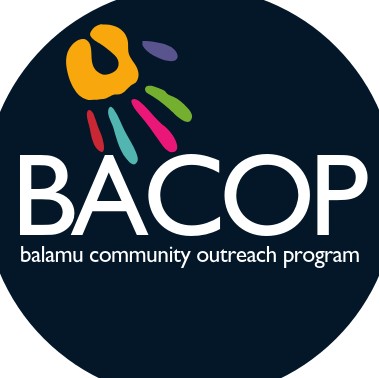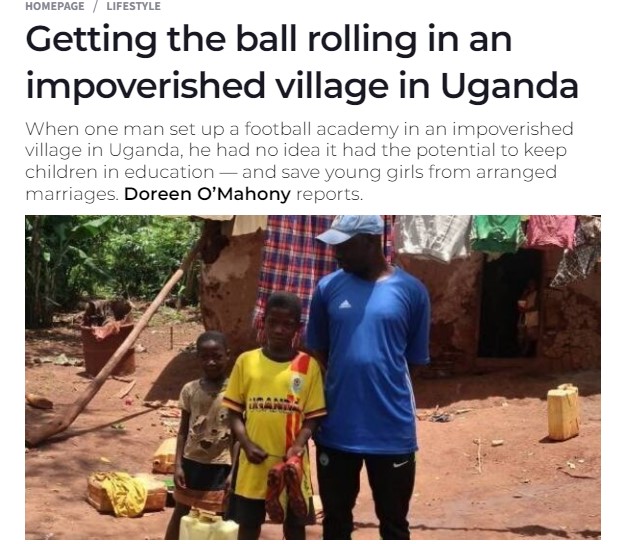Balamu Football Academy is getting known in other countries. Recently, an article about it appeared in the Irish Examiner news paper.
Getting the ball rolling in an impoverished village in Uganda
Wasswa village near Lugazi in East Africa is like an island but instead of being surrounded by water, it lies at the centre of perennial grasses of sugar cane. The sugar canes are tall, bright and green.
They sway at each side of the dirt, mud road leading to the village. At the heart of the village are a few houses made from red mud bricks. There is little else but some makeshift wooden stalls where women sell vegetables and flatbread known as chapattis.
Old men and children sit outside on wooden benches passing the time of day. Others work for about $10 a month at the Mehta Sugar factory in Lugazi. In the middle of the village flanked on one side by a derelict school lies a pitch where 40 children aged 8-12 are playing football.
This is Balamu football academy, an academy that is changing the course of their lives.
Two years ago Moses Wambale, a 35-year-old Ugandan scout leader took some children from a privileged international school to go zip-lining at Griffin Falls Camp near Waswa.

He challenged the local kids to a football game with his scout kids to develop relationships between both sides. The local kids won 3-0 despite the fact that they were poorly fed and didn’t even have football boots.
Realizing that there was a lot of talent in the village he started the Balamu Football Academy in their village.
He says: “We decided to make a football academy for the kids so that they can have more opportunities.
The kids begin working in the sugar company when they are 14, some of them work in the forest to make charcoal, they don’t go for education, and they get married from the age of 12. We can give them trials to access education in urban areas.
Every Saturday the kids are trained by professional coaches. Moses has managed to get sports bursaries for the more talented players, both boys and girls, in the nearby city of Mukono. This means that they will be educated for free.
In one case, that of Nanfuma Rose, aged 12, the sports bursary she won changed the course of her life.
She says: “My mother says that she does not have the money to finance my secondary education. I didn’t know that my daddy, aunts and relatives already have got a man to marry me when I finish my exams. Then I said to my mother that if football saves me from getting married at my age, then I will play better than the boys.”
She is currently continuing her education in Mukono at the age of 14. Napijja Shadia, a shy, small girl aged 8, lives with her family in a small house at the top of the pitch.
Every Saturday she used to stare at the kids playing football. One day a volunteer from the academy asked why she didn’t play. She said that she could not afford to buy the football shoes. The volunteer paid the eight dollars they cost and she has played football ever since.
Her mother proudly shows her report card and says that her daughter is first in her class of 50. She says that Napijja’s confidence is growing every week. Moses hopes to help her to get a sports bursary so that she can continue her education.
A small distance away from her house lives Bukenya Balikuddembe (meaning peaceful).
He lives with six of his siblings and his mother in a two-roomed unfurnished, dark house. His father died recently and his mother struggles to provide for them. She sells vegetables in a nearby village.
A pig wanders around the small holding. Outside his 11-year-old sister cuts onions and tomatoes into a pot on an open fire as she prepares lunch. It is difficult to distinguish whether his siblings are boys or girls.
The girls wear their hair cut short and it’s not uncommon for boys to wear skirts or dresses. Moses points to the boy’s fingers and toes which are infected with jiggers, a parasite insect found in tropical climates.
They are embedded in his fingers and toes and will need to be pulled out with a needle.
They occur where there is poor hygiene and where animals and humans live closely together.
Yet when he puts on his Ugandan football shirt and boots to prepare for practice, the weariness leaves his face and he smiles.
Moses says that he is one of the most talented players on the team. He is considering fostering him, just as he was fostered himself so that he can give him more opportunities.
As each of these three children make their way onto the pitch they are joined by others. A group of boys from nearby Najjembe walk miles through the forest every Saturday for practice.
They are starving when they arrive yet play for hours on empty stomachs taking only water breaks. They will eat one good meal when they go back to their village at dusk.
Not all of the kids will keep up the training. They are needed to dig the land, collect firewood and work in the factory.
Often parents don’t see the benefits which is why Moses has assembled a board of organisers to help him.
Every so often the board meets the parents of the players under a mango tree near the pitch.
There they explain which of the players have received bursaries and Moses outlines his dream of building a training centre on the pitch. At the end of the meeting exercise copies and pencils are handed out to the parents for the kids.
It’s a small incentive to ensure the parents continue to send their kids to train. One young mother puts up her hand and asks what’s in it for him?
He explains that he wants to do this because of the life that education gave him. But that’s not the only reason. Moses knows that he’s developing some serious talent in Waswa. He’s hoping to discover next Ronaldo or Messi.
He tells the kids that if they practice maybe they can play for a club professionally.
He says:
There is a lot of unemployment and everyone is expecting the government to provide jobs but if you train the kids to explore their talents they can be like me. I did social studies in the university but scouting changed my life. I believe football can change their lives.
Not all of them will be lucky enough to get bursaries but for a few hours every Saturday they escape from their chores and responsibilities, from the hunger and poverty. They are carefree, childlike and full of hope and maybe that’s enough.
https://www.irishexaminer.com/breakingnews/lifestyle/features/getting-the-ball-rolling-in-an-impoverished-village-in-uganda-874988.html


Leave a Reply